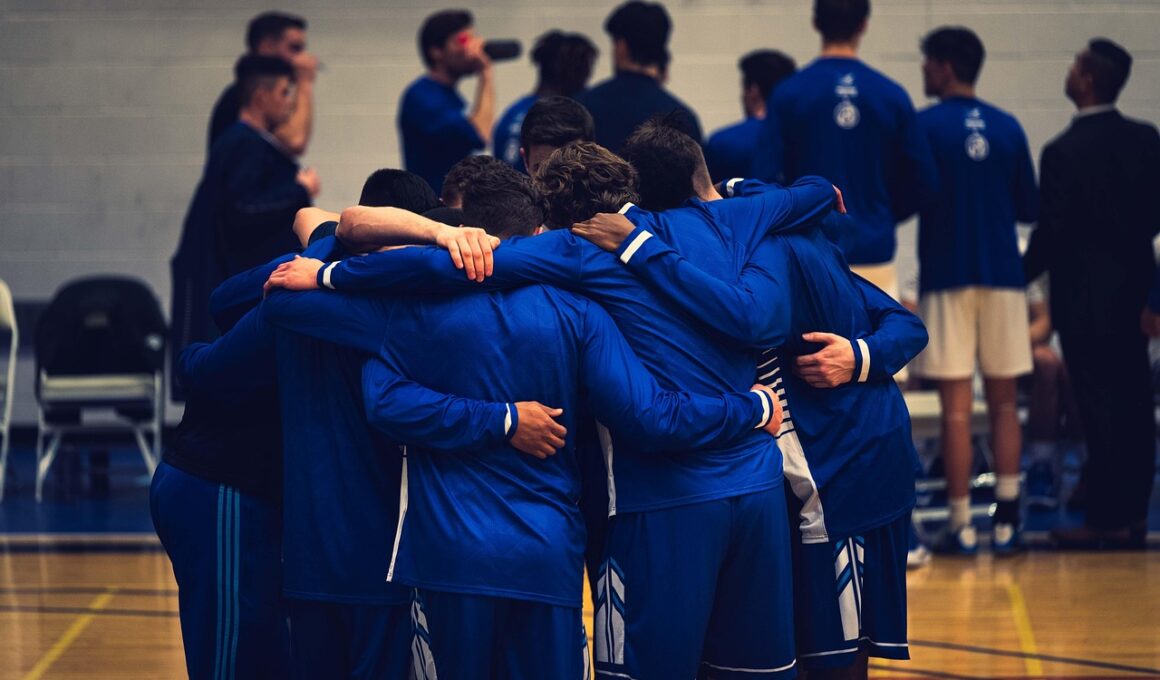Building Team Chemistry for Competitions
Team chemistry is crucial in basketball, especially during tournaments and competitions where players must work seamlessly together. Understanding each other’s strengths and weaknesses fosters a strong bond among teammates. One effective approach is through team-building exercises that encourage communication and cooperation. Players should engage in drills that require passing, screening, and movement without the basketball, emphasizing coordination and trust. This type of practice will help in developing non-verbal cues. Additionally, participating in off-court activities, like group outings or community service, can enhance relationships outside the game. These experiences build trust and camaraderie, creating a more cohesive unit. Players may learn about each other’s backgrounds, interests, and motivations, which can translate into better on-court performance. Furthermore, fostering an environment where all team members feel valued is paramount. Encouragement and open communication can help players express themselves freely. Coaches should facilitate discussions about gameplay strategies and conflict resolutions, ensuring all voices are heard. In conclusion, investing time in building team chemistry can greatly improve a team’s performance in highly competitive situations and promote a more positive overall environment.
Effective communication within a team is essential for success during competitions. Players must feel comfortable sharing ideas, feedback, and potential disagreements. By creating an environment that welcomes open dialogue, teams can address conflicts before they escalate. Regular meetings and debriefs after training sessions allow players to share insights about their performance and the overall team dynamics. This practice promotes accountability and encourages individuals to express their thoughts openly. Moreover, implementing clear roles and responsibilities helps in minimizing confusion during games. When teammates understand their specific tasks, they are more likely to collaborate effectively. Coaches can facilitate this by assigning roles based on each player’s strengths and skills. Encouragement and constructive criticism should be a part of this process. By highlighting individual contributions, players feel more engaged and appreciated, enhancing their commitment to the team. Additionally, consider using technology, such as video analysis, to review team performance. This method enables players to see themselves in action, reinforcing learning and identifying areas for improvement. A cohesive understanding of gameplay patterns fosters strategic planning, ultimately leading to better outcomes in high-pressure situations during competitions.
Practicing Collaborative Drills
Incorporating collaborative drills into regular practice can significantly enhance team chemistry. These drills require players to rely on one another, encouraging cooperation and understanding of roles. For instance, implementing two-on-two or three-on-three scenarios during practice helps familiarize players with working closely together. Such drills promote quick decision-making and improve timing during plays, allowing teammates to develop their instincts. Moreover, varying practice partners helps players adjust to different playing styles, creating versatility. Another beneficial drill is the ‘give and go,’ where players must pass the ball and move to open spaces. This fundamental technique enhances not only passing accuracy but also teamwork. Teams can also engage in scrimmage matches that mimic competition settings. This live action allows players to apply their learned skills dynamically and collaboratively. Coaches should analyze these scrimmages, providing feedback on teamwork and decision-making processes. Additionally, emphasizing the importance of communication during these practices reinforces that talking and signaling are essential skills. To sum up, these collaborative practices not only improve basketball skills but also strengthen team bonds, ultimately leading to improved chemistry on game day.
Building emotional intelligence among players is also essential in fostering team chemistry. It involves recognizing and managing one’s own emotions while understanding those of others. Coaches can facilitate workshops or activities focusing on empathy and self-awareness. These workshops can teach players how to handle pressure and stay calm during tense situations in competitions. Recognizing when a teammate is struggling or excelling can motivate others to support or elevate their performance. Encouraging players to celebrate each other’s successes fosters a positive atmosphere within the team. It is essential to create a culture that prioritizes shared goals over individual accolades. This mentality not only nurtures collaboration but also strengthens the commitment to the team. Another way to build emotional intelligence is by practicing mindfulness techniques. This can help players stay focused during games, reducing anxiety and improving performance. Coaches can introduce breathing exercises and visualization techniques in training sessions. Developing these skills ensures players can navigate intense moments with poise and confidence. By prioritizing emotional intelligence, teams can cultivate a supportive atmosphere, enabling each player to thrive and contribute positively to the team’s overall success.
Fostering Trust and Respect
Trust and respect are pillars of strong team chemistry. When players trust one another, they are more likely to assertively share the ball and engage in effective teamwork. Coaches can help foster this environment by acknowledging that mistakes are part of learning. Encouraging players to own up to their errors boosts accountability and transparency among teammates. This atmosphere facilitates open communication, which further enhances respect. On the court, trust manifests in players making plays for one another without hesitation. One effective strategy is to encourage players to develop individual relationships with each other. Simple gestures such as high-fives, encouraging words, and celebrations of small victories promote mutual support. Coaches should recognize and reinforce these behaviors, ensuring players understand the significance of camaraderie. Additionally, trust exercises, like falling backward into a teammate’s arms, reinforce the premise that team members can rely on each other. Building respect also means valuing differences and embracing diversity. Teams composed of diverse players can draw from a broader range of perspectives and strategies, which may lead to innovative plays. Strengthening trust and respect among players creates a solid foundation for success in competitions.
Another key aspect of building team chemistry is setting clear goals. When all players understand the objectives for the season, they are likely to work collaboratively towards them. Coaches should involve players in goal-setting activities, allowing them to express their personal aspirations within the team framework. This collaborative approach fosters ownership of these goals and commitment to achieving them. Goals should be specific, measurable, attainable, relevant, and time-bound (SMART). For example, a specific goal could be to increase team assists per game, which requires collaboration and communication on the court. Regularly revisiting these goals during team meetings helps to maintain focus and motivation. Additionally, recognizing achieved milestones validates the team’s hard work and reinforces their collective effort. Furthermore, celebrating both individual and team successes along the way contributes to a positive mindset. This acknowledgment can be in the form of awards or simple shout-outs during practice sessions. Emphasizing the journey of development rather than just the end result contributes to a stronger team bond. By establishing shared goals, players will naturally begin to rely on each other more, heightening the chemistry during competitions.
Conclusion
Ultimately, building team chemistry for competitions in basketball hinges upon commitment, trust, and collaboration. Teams that invest time in developing these areas tend to experience improved performance during high-stakes situations. Engaging in communication and collaboration exercises, setting collective goals, and fostering emotional intelligence can significantly elevate a team’s dynamic. Furthermore, understanding each player’s strengths and difficulties cultivates an environment of trust, respect, and accountability. Coaches play a vital role in facilitating these processes by creating a safe space for dialogue and teamwork. Teams should also participate in collaborative drills and practices that emphasize each player’s contribution. Over time, these combined efforts will lead to a naturally cohesive unit that thrives under pressure. As players come to rely on one another, they develop a deep camaraderie that translates to their gameplay. The chemistry cultivated in practices will carry into competitions, making the team feel more united and confident. Therefore, it is essential for teams to prioritize chemistry building as a crucial aspect of their training regimen. With a focus on teamwork, the collective experience becomes just as fulfilling as winning, promoting an enduring passion for basketball.
Building team chemistry will undoubtedly result in a fulfilling journey for any basketball team, regardless of their competitive level. Players not only develop skills but also lifelong friendships that extend beyond the court. Properly nurturing these relationships through focused training, communication, and trust-building creates a stable foundation for success. Everyone involved will create memories and experiences that define their basketball journey, leaving a lasting impact on personal and athletic development. Basketball is as much about strategy as it is about emotional connections; when teammates support each other, the benefits extend to the scoreline. Ultimately, the goal of any competition is to shine as a cohesive entity on the court. Prioritizing these relationships within the context of tournaments can lead to remarkable results and an invigorating atmosphere. Coaches, players, and support staff should work together harmoniously, ensuring that chemistry remains a priority throughout the training and competition cycle. Each practice, inter-team event, or game should serve as a stepping stone towards fostering this essential aspect of basketball. With dedication, any team can thrive and achieve great things together both on and off the court, creating an unforgettable basketball experience.


